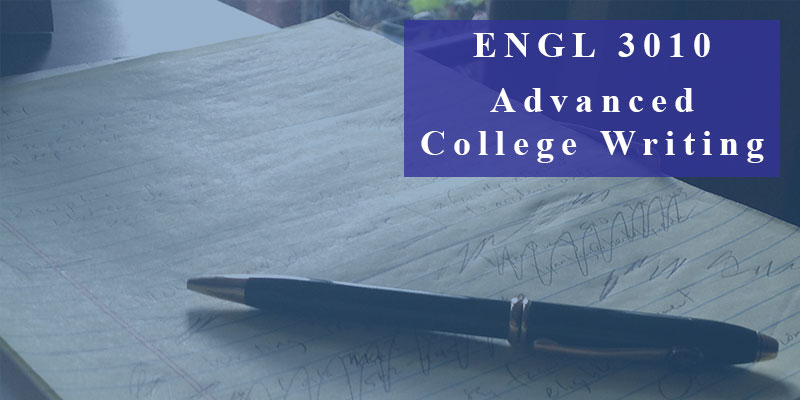Catalog Description
Prerequisite: Satisfactory completion of the GE Block A. Instruction for students in all disciplines in methods of and practice in college writing; emphasis on critical reading and writing and advanced rhetorical issues including invention strategies, arrangement, selecting and analyzing evidence, and developing an appropriate style.
Course Description
ENGL 3010, Advanced College Writing, helps students in all disciplines learn methods of and gain practice in college writing, with an emphasis on critical reading and writing and advanced rhetorical issues including invention strategies, arrangement, selecting and analyzing evidence, and developing an appropriate style.
Learning Outcomes
Upon completion of this course, students will be able to:
- Refine fundamental rhetorical strategies used to produce university-level writing, especially
- modify content and form according to the rhetorical situation, purpose, and audience
- incorporate textual evidence through quotation, summary, and paraphrase into their essays and appropriately cite their sources
- evaluate the relevance, validity, and authority of information, and ethically use and cite that information in their own writing
- Think critically to analyze a rhetorical situation or text and make thoughtful decisions based on that analysis, through writing, reading, and research
- Identify and develop advanced techniques for managing their writing process, including using various invention heuristics, gathering evidence, drafting, revising, editing, and proofreading, with a focus on the processes of revision
- Analyze, evaluate and draw inferences from information from various sources
- Identify, select, and analyze the appropriate research methods, research question, and evidence for a specific rhetorical situation
- Demonstrate the ability to develop advanced techniques for organizing and improving the coherence of complex documents
- Critique their own work and that of peers using the conceptual and stylistic conventions of academic discourse
- Exhibit knowledge of genre conventions ranging from structure and paragraphing to voice, tone and style
- Demonstrate understanding of and ability to adapt to the nature and requirements of writing in different academic disciplines and genres
- Control such surface features as syntax, grammar, punctuation, and spelling
- Use electronic environments for drafting, reviewing, revising, editing, and sharing texts
Course Content
Because writing and language competence develop recursively, the course content for ENGL 3010 builds on the work students have begun in ENGL 1005A-1005B or ENGL 1010 and other writing courses taken. The course content will vary by instructor given that the course is more a means to an end—developing more self-aware, rhetorically sophisticated, and rhetorically and stylistically effective writers.
Listed below are some of the key goals around which course content will be focused:
- help students assess genre and rhetorical situation
- help students reflect on the relationship between genre and rhetorical situation and how meaning is created
- help students interrogate the relationship between class, gender, race, ethnicity and other categories of difference and privileged, standard registers of usage and clarity
- help students recognize and develop visual literacy and rhetoricity through understanding of theories of visual communication
- help students understand how technologies affect the ways they read and write
- help students consider through contrastive rhetoric the relationship between dominant and minority styles
- help students understand and achieve civic literacy through an examination of public discourse
- help students conceptualize and actualize rhetoric and writing as a means of social change
These key goals and approaches might be organized in one of the following ways:
- an advanced writing course for specific disciplines or for specific student populations, such as a section focused on Writing for Business, or Writing for the Humanities, or Writing for Engineering
- an advanced writing course focused on specific kinds of writing, such as Technical Writing, Professional Writing, or Workplace Writing
Regardless of the organization, all advanced writing courses focus on the key rhetorical terms of purpose, audience, and genre, as the foundation of the decisions that experienced writers must make when drafting and revising. For this reason, students will be asked to
- Prewrite, draft, write, and revise at least three pieces of formal writing of various lengths. These pieces of writing will be written in a variety of genres, assume a variety of rhetorical approaches, respond to the rhetorical situation, address a specific audience, address a variety of viewpoints, and articulate a stance.
- Use critical reading strategies to understand a range of public and academic writing.
- Explore through reading, research, and discussion, in order to articulate in writing, the complex relation of the self to society through students’ reflection on their lives, goals, and problems in relation to the values, decisions, and beliefs of others.
- Incorporate textual evidence in writing, when appropriate, through the use of paraphrase, summary, and quotation.
- Investigate the relationships between stylistic options and audience response.
- Practice strategies for meaningful revision and recognize that writing is a recursive process.
- Learn about the resources available through the University Writing Center, University Library, and other centers of information.
